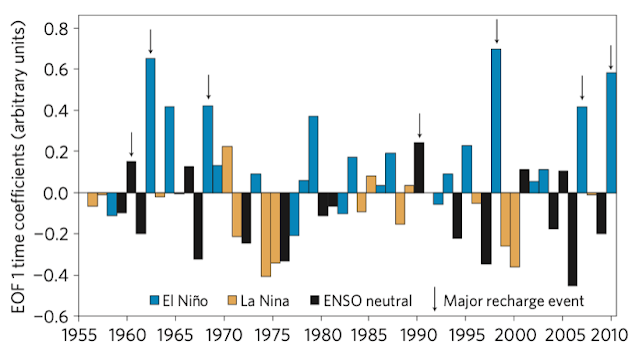Groundwater, Climate Change and Water Management in Africa - An Overview
Hi! Welcome back to my blog!
In last week’s article, we highlighted the need to not consider Africa as a whole but instead to keep in mind its complexity, physically, politically and socially in all aspects. In this week’s post, I would like to bring up the focused themes of this blog: groundwater, climate change and water management. By exploring how these three elements interact in different regions and places in Africa, we will be able to compare, and, hopefully, evaluate different mitigation and adaptation strategies for the better water management system(s) in Africa.
Why climate change and why groundwater?
The topic of climate change is under the spotlight when discussing environmental change. The myriad of environmental changes are entangled with climate change and hence discussing its impact can bring new insights into the conversation.
The attention for groundwater is owing to the recognition that groundwater is a critical freshwater resource for global food and water security, as well as for ecosystem sustainability and human adaptability to climate unpredictability and change. Groundwater is critical for ecosystem sustainability and human adaptability to significant and unexpected global climatic changes, especially as surface water systems become increasingly unreliable in the face of fast population expansion and climate change.
With the changes in demographic structure and rapid urbanisation in Africa, managing groundwater in Africa become more complex than ever. The urge to recognise problems and to find fitting solutions is underlined.
Climate change is happening
Figure 1. Change in global ocean heat content, 1958-2017.
The year 2017 experienced the warmest recorded temperature in the global ocean, according to the Institute of Atmospheric Physics, Chinese Academy of Sciences, as the result of the continued impacts of human greenhouse gas footprint on the Earth system (Figure 1).
It is almost common sense now that global increased temperatures, as an outcome of global climate change, have led to the melting and receding of glaciers and ice sheets. Moreover, this rise in global temperatures is also expected to lead to the corresponding intensification in evaporation and evapotranspiration. Precipitation is expected to be higher in intensity but less in frequency in some places; while other places might experience drought.
These changes in average annual rainfall are likely to have an impact on the water balance in general. With the differences in precipitation, in terms of temporal and geographical distribution in Africa, groundwater recharge, in particular, will be facing great changes. This is because the groundwater system interacts closely with Earth’s components, for example, precipitation, evaporation and extractions, and more than ever, the changing environment that was caused by human actions, such as urbanisation, will further alter the mechanism of the original groundwater system.
Groundwater in Africa
Groundwater recharge is usually mainly dependent on the climate element precipitation, and since that climate act as the primary factor driving spatiotemporal variability in recharge, the mechanism of groundwater recharge is closely linked to climate change. This highlights the need for future studies on groundwater management to take into consideration the consequences of the ongoing climate change event.
Groundwater is generally influenced by the intensity, over the amount, of rainfall, as well as the type of precipitation event, for example, snowmelt is a more efficient recharger than rainfall for the most part. Evapotranspiration may prevent infiltration and stop the water from recharging below the root zone, therefore, noting the infiltration capacity of the soil, light rainfall is less likely than intense rainfall from recharging groundwater. Yearly runoff and recharge totals are more susceptible to short-term rainfall distribution than annual total rainfall, as is well known. Furthermore, a protracted period of medium-intensity rainfall is more likely to result in considerable recharging than either a period of high-intensity rainfall (which will result in increased runoff) or a period of low-intensity rainfall (which will result in decreased recharge) (most of which will evaporate). This is especially true in semi-arid settings with drier conditions.
Water Management - Questions to think
The global difference in natural adaptation to changes in temperature and precipitation results in levels of alteration in groundwater availability in different places in Africa.
A number of questions arise in this content:
What is the probable future rise in groundwater demand as a result of population growth?
Are changes in the environment always faster than adaptation…?
What actions do we need to take…Where should our priorities lie?



This builds on the inital post to explore the trilema of groundwater,rainfall and climate change. It is well presented with good engagement with literature. The only challenges is that ideas of groundwater and rainfall deserve individual posts with climate change as a thread running across these posts. Also, the use of a case study location or country will be equally helpful (or maybe not).
ReplyDeleteThank you Clement on your comments! Yes, I agree, the ideas of groundwater and rainfall deserves more details to be explained. I have further explained the two ideas in my following posts with case studies, hopefully this will better present the issues that I want to address.
DeleteThis post discussed water and environmental change in Africa from climate change, ground water supply and water management three aspects. I was very excited to see the connection between three factors, especially the geological explanation of how climate change drastically impact the ground water supply. I am particularly concerned with the first question arises in the post. I believe ground water can offer a short-term solution to African water supply; however a structural and systematic change to the water supply system in Africa is in order.
ReplyDelete